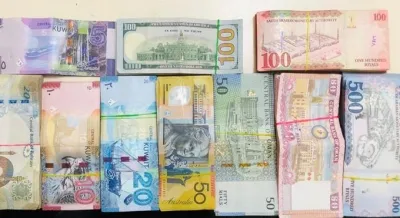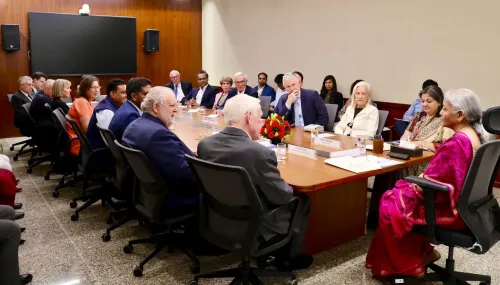Why Have Foreign Currency Smuggling Cases Increased Over Tenfold in South Korea?

Synopsis
Key Takeaways
- Illegal foreign currency smuggling has surged over tenfold in four years.
- Record seizures reached 143.5 billion won in early 2025.
- Cases have diversified, with new countries becoming involved.
- Authorities need to implement stronger countermeasures against these crimes.
- Demand for coins during holidays has significantly decreased.
Seoul, Oct 5 (NationPress) The illicit movement of foreign currency has surged by over ten times in the last four years, achieving a record level in the first half of 2025, recent data revealed on Sunday.
The total amount of foreign currency confiscated in these incidents reached 143.5 billion won (approximately US$102.14 million) during the January-June timeframe, more than doubling the 65.5 billion won recorded for the entirety of 2024, according to statistics compiled by the Korea Customs Service and disclosed by Rep. Park Sung-hoon of the main opposition People Power Party, as reported by Yonhap news agency.
Confiscated sums have consistently increased over the years, climbing from 14.3 billion won in 2021 to 17.5 billion won in 2022, and escalating to 46.4 billion won in 2023.
The number of illegal foreign currency trade cases has also steadily risen from 369 in 2021 to 537 in 2022, 678 in 2023, and 751 in 2024.
In the first half of 2025, this figure reached 316.
The nations implicated in illegal foreign currency transactions have diversified significantly.
Up until 2022, the United States, Japan, and China represented over half of all cases, but their combined share dropped to 27 percent in 2024, while cases involving other nations, including Vietnam, the Philippines, Hong Kong, and Mongolia, saw a substantial increase, according to the data.
"Illegal foreign currency trade is frequently utilized as a means for various crimes, including drug trafficking, smuggling, and voice phishing. Robust countermeasures are essential," stated the lawmaker.
Meanwhile, demand for new coins during traditional festivities has significantly declined due to decreased cash utilization and rising prices, as indicated by central bank data released on Sunday.
During this year's Lunar New Year holiday in January, the total exchanged amount for all coin denominations—10 won, 50 won, 100 won, and 500 won—was recorded as zero, as per data from the Bank of Korea (BOK).
In contrast, last year's Lunar New Year saw exchanged amounts totaling 100,000 won for 10-won coins, 500,000 won for 50-won coins, 2 million won for 100-won coins, and 9 million won for 500-won coins.
"This decline appears linked to reduced cash usage overall. Rising prices have also influenced the demand for coins," remarked a BOK official.
The BOK issues new coins and banknotes in advance of traditional holidays to cater to the demand for holiday gifts and symbolic purposes.









